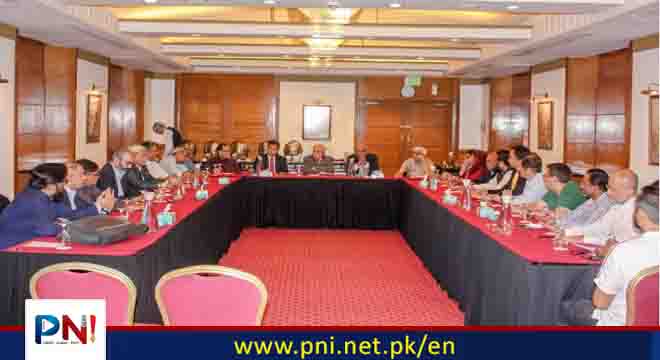KARACHI: Employers’ Federation of Pakistan Industrialists representing Industrial Town Associations and Trade Associations deliberated and discussed the prevailing economic scenario and expressed their deep concern on its negative impact on employers and workers at the Consultative Session organized by Employers’ Federation of Pakistan with the support of ILO on the economic crisis and its Impact on industry. The emphasis and focus were on minimum wage, labor inspection, retrenchment of workers, industrial relations, enterprise sustainability, and social protection of workers.
Syed Nazar Ali, Secretary General EFP, while moderating the session, gave an overview of the situation faced by workers and employers, asked participants to highlight the economic issues, and requested the 30 plus participants to suggest a pragmatic way forward. He stated that EFP is very concerned with news about closure of factories and has been receiving urgent messages from leaders of workers regarding retrenchments and layoffs.
Majyd Aziz, Former President of EFP, who chaired the meeting, said that Pakistan’s dire economic, financial, and political situation has resulted in a serious challenge to the survivability and sustainability of the country. He said that high inflation, supply chain disruption, back-breaking increases in the rates of gas and electricity, currency devaluation, declining exports and remittances, have all substantially increased the cost of production. “The closure of factories is a direct result of these factors and despite sensitizing the government to understand the gravity of the situation and to take immediate action, there is inertia in the corridors of power.”
He advised all trade bodies to unite and raise a common voice instead of devoting their time, money and efforts in elections in their organizations and issuing negative statements. The absence of a strong national business leadership has created many mini leaders and has diluted the voice of the private sector. The onus of industrialization, exports enhancement, provision of favorable utility rates, and facilitating the private sector, is primarily the responsibility of the government. Therefore, it is imperative that the private sector strongly demands that the government must become a facilitator and take measures to get out of the economic and financial crises.
Engineer M. A. Jabbar, VP of FPCCI, said the political instability is creating an anti-investment environment and both local and foreign investors are hesitant to make substantial investments because the policies, programs, taxation system, and infrastructure is not industry friendly. The weakness of the private sector is so apparent that the Employers on various boards are not even raising their voice and concerns. He also suggested that the labor levies and multiple inspections should be combined and EOBI be transferred to provinces in the real spirit of the 18th Constitutional Amendment.
Riazuddin, Former President SITE Association of Industry said that industry and industrialization in the country are not the priority of political parties. There is no industrial policy and program to support the local industry. Pakistan is being prematurely deindustrialized. He said the domestic industry has the potential to grow but due to unfavourable policies and unstable political environment, it could not demonstrate innovation, quality and productivity that are the main ingredients for growth and competitiveness. He also pointed out that affordable financing is also not available for industry.
Kalim Farooqi, Former President of Pakistan Japan Business Forum, advised industrialists to first get their own organizations in order and also called for collective action rather than each Association going solo. Khalid Riaz of SITE Association pointed out that the law and order situation is also an issue. SITE industries are paying for their own security, using their own energy and water. He said that industry is contributing to SESSI, EOBI, and other levies, but workers do not go to SESSI Hospitals due to poor quality of services and non-availability of medicines.
Asif Zuberi, Chairman WEBCOP Sindh, agreed with the points and suggestions raised by the participants and said most of the suggestions are very important and the government needs to shift focus for the development of local industry. Nevertheless, industrialists should not expect from the government but must find solutions themselves. He proposed one-window, one-levy for all worker welfare-related contributions.
Mr. Zuberi pointed out the need of a Social Contract between workers and employers and said a bilateral relationship based on respecting the rights of each other is the only solution to many problems raised by the participants, particularly about various worker welfare institutions. He stressed upon the need to use the platform of WEBCOP and developing consensus on issues through collective efforts for the protection and promotion of industry.
Follow the PNI Facebook page for the latest news and updates.









